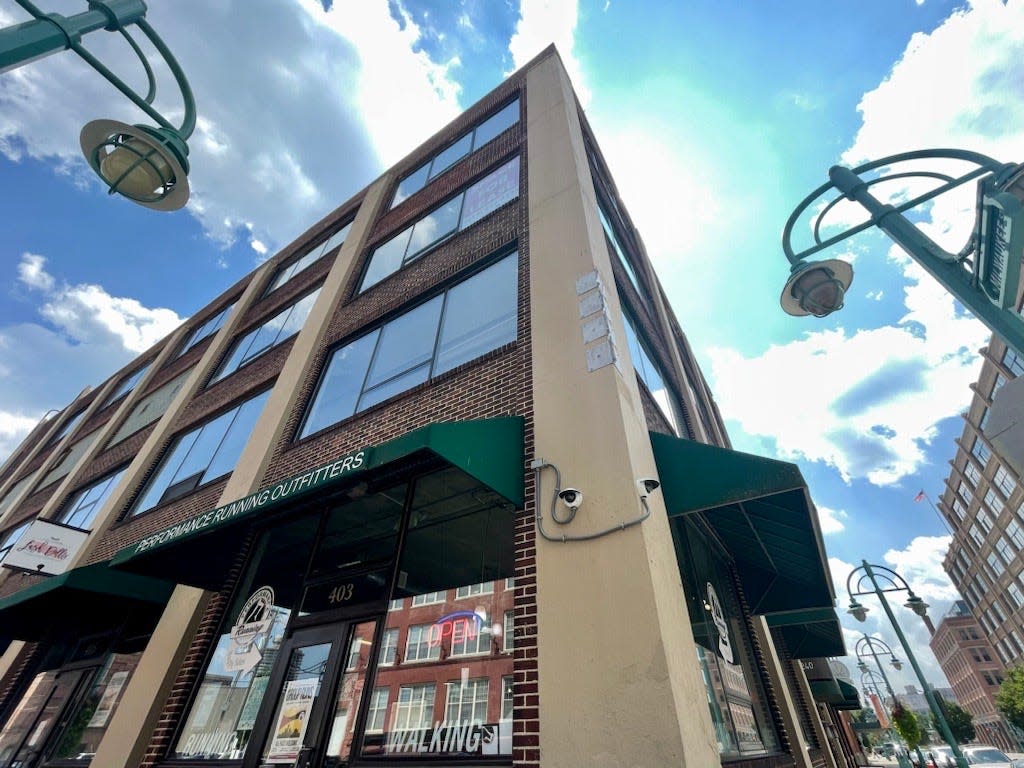Milwaukee police using technology that allows for real-time access to security cameras

- Oops!Something went wrong.Please try again later.
Milwaukee police announced Thursday it began using a new technology that can give the department real-time access to privately owned security cameras — as long as the cameras' owners allow it.
Police, along with Mayor Cavalier Johnson, said at a press conference the technology will allow a department that has shrunk in staffing to cut down on the labor-intensive effort to collect video footage after crimes occur — and may deter other incidents from happening at all.
“It’s voluntary. This is not something the Police Department is forcing on anyone,” Chief Jeffrey Norman said. “We’re not putting cameras out there.
“We are partners with our community. We’re working with our public in a collaborative way.”
But even before the technology came to Milwaukee — where it has been live since Monday — it has caused concerns over privacy issues and the potential for abuse.
“It is a potentially big step forward in the expansion of more and more surveillance,” said Timothy Muth, the legal director for the ACLU of Wisconsin. “I’d have a lot of questions about basic things — where businesses are giving real time access to the police, what happens to that video? Is it stored?”
Here’s what to know about the program officials detailed Thursday:
Camera owners decide what access to give police
Camera owners can let police know they have a camera, where it is and how to contact them for the footage if needed. The technology also allows owners to give police real-time access to their camera either all the time or at the owner’s discretion with the use of an app or a manual button.
Police said the program is compatible with most kinds of private security cameras businesses typically use. It's also compatible with Ring doorbell cameras. However, Assistant Chief Paul Formolo said Milwaukee’s program isn't yet set up for real-time access to them.
To give real-time access, owners have to purchase additional equipment. Anyone can sign up for the program at CommunityConnectMilwaukee.org.
The Police Department isn't sharing the location of participating cameras.
The technology comes from a company called Fusus
Fusus is a police and security technology company based in Georgia. Its camera technology is operating in over 60 cities and counties in the U.S., according to a May report from the Thomson Reuters Foundation.
A blog post on the company’s website cites Fusus camera technology as a reason behind high clearance rates for homicides in Atlanta, the recovery of stolen property in Rocky Mount, N.C., and locating missing persons, stolen vehicles, hit-and-run suspects and wanted persons in Bay County, Florida.
According to Milwaukee police and Fusus, the program doesn't incorporate facial recognition technology but can be used to recognize weapons or vehicles.
Officials tout program as voluntary, efficient
Officials repeatedly stressed the program only gives as much access to police as cameras owners want. They also reminded the public that, long before Thursday, police created a database of privately owned cameras and how to contact owners for footage.
Johnson called it another “tool” for police to work more efficiently.
“Is this some sort of dystopian technology that infringes on rights and privacy? The answer to that question is no,” he said.
Formolo, who heads the department’s criminal investigations bureau, said having instant access to video can save a significant amount of manpower during investigations. Following an average nonfatal shooting, Formolo said, at least two detectives can spend four to six hours canvassing for video.
It's not clear how many cameras are already sharing footage in real time with the Police Department.
Paul Schwartz, the executive director of the Business Improvement District for the Third Ward, said at the announcement that 130 cameras his organization owns in the neighborhood will register with the program. He said some cameras may allow real-time access.
“We don’t want any of that economic growth to be stunted by criminal activity that cannot be investigated and prosecuted,” he said.
Program isn't voluntary for people being recorded, ACLU says
Muth, the legal director for the ACLU of Wisconsin, listed a number of concerns with the technology. Although Fusus doesn't use facial recognition, it uses artificial intelligence to recognize other things in footage, which Muth argues can lead to false positives.
What's also worrisome to Muth is the potential for cameras to be used for surveilling people engaging in protests and other First Amendment activities, or if a window into someone’s residence is included in the camera’s frame.
“There’s a huge number of questions out there about this,” he said.
He argued that people being recorded deserve to have a say in whether the technology is used. He noted that elected officials in Columbia, Mo., voted against implementing its use.
“It is a broader community decision about what level of surveillance regime we want in the city of Milwaukee,” he said.
Technology’s purchase came from donations
The price of the technology wasn't disclosed at Thursday’s press conference, but officials said the costs were paid for by donations from the Milwaukee Police Foundation, Mill Valley Recycling and Milwaukee Iron and Metal.
The program will result in an annual expense of $125,000 that the department is hoping will still be covered by private donations, according to Heather Hough, the department’s chief of staff.
Contact Elliot Hughes at elliot.hughes@jrn.com or 414-704-8958. Follow him on Twitter @elliothughes12.
This article originally appeared on Milwaukee Journal Sentinel: Technology allows Milwaukee police to access cameras in real time

